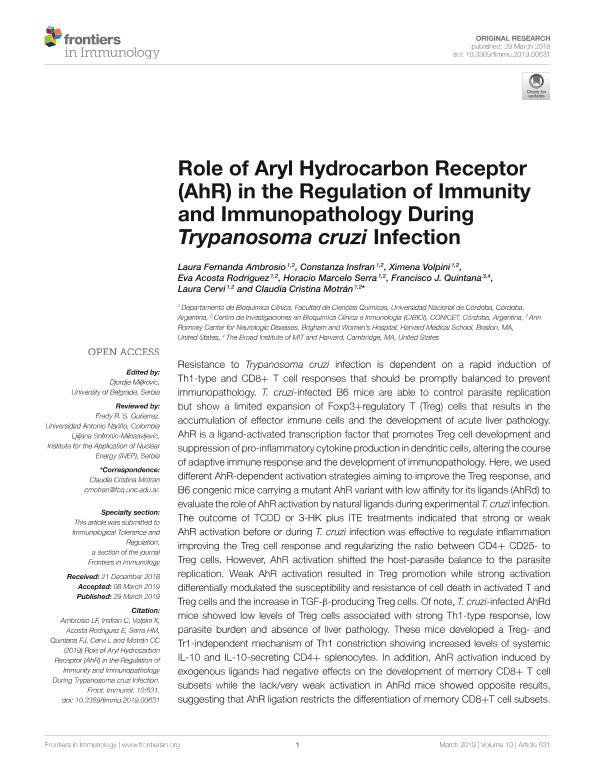Artículo
Role of aryl hydrocarbon receptor (AhR) in the regulation of immunity and immunopathology during trypanosoma cruzi infection
Ambrosio, Laura Fernanda ; Insfran, Constanza
; Insfran, Constanza ; Volpini, Ximena
; Volpini, Ximena ; Acosta Rodriguez, Eva Virginia
; Acosta Rodriguez, Eva Virginia ; Serra, Horacio Marcelo
; Serra, Horacio Marcelo ; Quintana, Francisco Javier; Cervi, Laura Alejandra
; Quintana, Francisco Javier; Cervi, Laura Alejandra ; Motran, Claudia Cristina
; Motran, Claudia Cristina
 ; Insfran, Constanza
; Insfran, Constanza ; Volpini, Ximena
; Volpini, Ximena ; Acosta Rodriguez, Eva Virginia
; Acosta Rodriguez, Eva Virginia ; Serra, Horacio Marcelo
; Serra, Horacio Marcelo ; Quintana, Francisco Javier; Cervi, Laura Alejandra
; Quintana, Francisco Javier; Cervi, Laura Alejandra ; Motran, Claudia Cristina
; Motran, Claudia Cristina
Fecha de publicación:
07/2019
Editorial:
Frontiers Media S.A.
Revista:
Frontiers in Immunology
e-ISSN:
1664-3224
Idioma:
Inglés
Tipo de recurso:
Artículo publicado
Clasificación temática:
Resumen
Resistance to Trypanosoma cruzi infection is dependent on a rapid induction of Th1-type and CD8+ T cell responses that should be promptly balanced to prevent immunopathology. T. cruzi-infected B6 mice are able to control parasite replication but show a limited expansion of Foxp3+regulatory T (Treg) cells that results in the accumulation of effector immune cells and the development of acute liver pathology. AhR is a ligand-activated transcription factor that promotes Treg cell development and suppression of pro-inflammatory cytokine production in dendritic cells, altering the course of adaptive immune response and the development of immunopathology. Here, we used different AhR-dependent activation strategies aiming to improve the Treg response, and B6 congenic mice carrying a mutant AhR variant with low affinity for its ligands (AhRd) to evaluate the role of AhR activation by natural ligands during experimental T. cruzi infection. The outcome of TCDD or 3-HK plus ITE treatments indicated that strong or weak AhR activation before or during T. cruzi infection was effective to regulate inflammation improving the Treg cell response and regularizing the ratio between CD4+ CD25- to Treg cells. However, AhR activation shifted the host-parasite balance to the parasite replication. Weak AhR activation resulted in Treg promotion while strong activation differentially modulated the susceptibility and resistance of cell death in activated T and Treg cells and the increase in TGF-β-producing Treg cells. Of note, T. cruzi-infected AhRd mice showed low levels of Treg cells associated with strong Th1-type response, low parasite burden and absence of liver pathology. These mice developed a Treg- and Tr1-independent mechanism of Th1 constriction showing increased levels of systemic IL-10 and IL-10-secreting CD4+ splenocytes. In addition, AhR activation induced by exogenous ligands had negative effects on the development of memory CD8+ T cell subsets while the lack/very weak activation in AhRd mice showed opposite results, suggesting that AhR ligation restricts the differentiation of memory CD8+T cell subsets. We propose a model in which a threshold of AhR activation exists and may explain how activation or inhibition of AhR-derived signals by infection/inflammation-induced ligands, therapeutic interventions or exposure to pollutants can modulate infections/diseases outcomes or vaccination efficacy.
Palabras clave:
AHR
,
CHAGAS DISEASE
,
ITE
,
REGULATORY T CELLS
,
TCDD
Archivos asociados
Licencia
Identificadores
Colecciones
Articulos(CIBICI)
Articulos de CENTRO DE INV.EN BIOQUI.CLINICA E INMUNOLOGIA
Articulos de CENTRO DE INV.EN BIOQUI.CLINICA E INMUNOLOGIA
Citación
Ambrosio, Laura Fernanda; Insfran, Constanza; Volpini, Ximena; Acosta Rodriguez, Eva Virginia; Serra, Horacio Marcelo; et al.; Role of aryl hydrocarbon receptor (AhR) in the regulation of immunity and immunopathology during trypanosoma cruzi infection; Frontiers Media S.A.; Frontiers in Immunology; 10; MAR; 7-2019; 631-641
Compartir
Altmétricas



